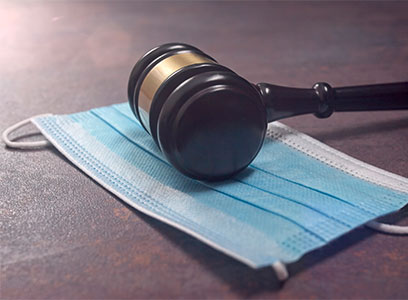
Resumption of Civil Trials in the COVID ERA
Understanding Civil Trial Court Procedures in the Covid ERA
By Gregg P. Tabakin, ESQ.
One of many negative effects that COVID-19 has had on the legal profession has been the almost total shutdown of courthouses in an effort to keep employees safe. As a result, all trials were put on hold until the court system could study the situation and devise ways to keep the judges, litigants, jurors, and court personnel safe for both bench trials and jury trials.
Bench trials have already resumed, as will be discussed below, and now, after almost 11 months, New Jersey is finally ready to restart civil jury trials.
Bench trials were an easier problem to solve as they typically involve fewer people and do not require jurors. Here, the solution was to conduct the trial using Zoom or another similar program that allows the parties to see and hear each other over an internet connection. By using this kind of application, the courts found that they could accomplish the goal of trying the case in a format that was substantially similar to a normal in-person trial before a judge at the courthouse.
Some attorneys have found that trying a case over Zoom presents its own set of problems, especially when dealing with a case that has a lot of documents or other exhibits. Still, when these difficulties are balanced against the need to achieve justice by obtaining compensation for aggrieved litigants, the need to resume trials has prevailed. Many litigants have had cases in the pipeline waiting to be tried for some time and deserve to have their disputes resolved, notwithstanding the difficulties posed by the COVID pandemic.
More difficult problems, however, needed to be solved before jury trials could continue. Several innovations were discussed and implemented, such as the installation of plexiglass panels, which acted to protect the judge, attorneys, and witnesses. Yet despite these efforts, a more creative way of protecting jurors was needed. Various ideas were considered, including putting the jurors in individual rooms to installing plexiglass between the jurors. Eventually, the solution came down to technology to the point that the court system felt comfortable enough to allow the resumption of jury trials. Initially, the restarting of jury trials will be limited to Atlantic, Cape May, Cumberland, Gloucester, Salem, Monmouth, Passaic, and Union counties so that bugs in the system can be worked out before jury trials in all counties resume on April 5, 2021.
When jury trials do resume, there will still be a number of options that litigators and their clients will need to decide. More specifically, in the lead-up to the trial, the court will direct the parties to enter into pre-trial orders that will address the various options that parties will have.
One of the initial choices will be whether to have a fully remote or hybrid trial. In a remote trial, all of the participants are outside of the courtroom, while in a hybrid trial, the judge and attorneys are in the courtroom, but the jurors and witnesses are not. Other questions to be addressed in a pre-trial order are how exhibits will be managed and submitted, how sidebars will be conducted, and what protocols are in place to ensure that jurors and witnesses are by themselves to avoid any coaching or undue influence by external factors. One such protocol is to have the jurors or witnesses pan around the room with their cameras so that the court and attorneys can be assured that they are alone and free from improper influences.
However, the biggest hurdle to resuming jury trials is how to include those potential jurors who do not have the requisite computer equipment, internet connection or computer skills. Since juries are made up of a cross-section of the community, it was important to include as many people as possible in the pools of prospective jurors. To make this work, the court system has invested a large amount of money to purchase equipment to outfit jurors with the electronic devices and technology needed, such as tablets to allow prospective jurors to participate during jury selection and possibly trial, if chosen to serve on the jury panel.
There is no doubt that there will be bumps along the way and more challenges ahead in making virtual trials work. Still, over time and with the available technology, this is a reasonable goal for litigants needing to resolve their disputes via trial. So, if you are one of the many litigants that have been eagerly waiting for your trial to be scheduled, your day in court may be closer than you think.
Update: On March 4, 2021, the New Jersey Supreme Court authorized the summoning of new jury pools for possible in-person reporting for socially distanced jury trials. The Court has approved a new modified form of summons that will inform prospective jurors that: (1) the jury selection process will begin in a virtual format; and (2) their service may continue virtually or may involve reporting in person to a courthouse with safety precautions. The new “virtual or in-person” summons option will apply to jury pools scheduled to report on or after May 17, 2021.
Schedule an Initial Consultation with an FSKS Attorney
If you have a litigation matter and wish to learn more about litigation services offered by Fein, Such, Kahn & Shepard, P.C., contact Gregg P. Tabakin, Esq. or Alan S. Golub, Esq. at (973) 538-4700.
Gregg P. Tabakin, Esq. is a shareholder of Fein, Such, Kahn & Shepard, P.C. and concentrates his practice in litigation matters in New Jersey and New York. He has been certified by the Supreme Court of New Jersey as a Civil Trial Attorney since 2006, a designation held by only about 2% of New Jersey attorneys. He also has been awarded an “AV Preeminent” rating by Martindale Hubbell, an independent service that has rated attorneys nationwide for more than a century.






